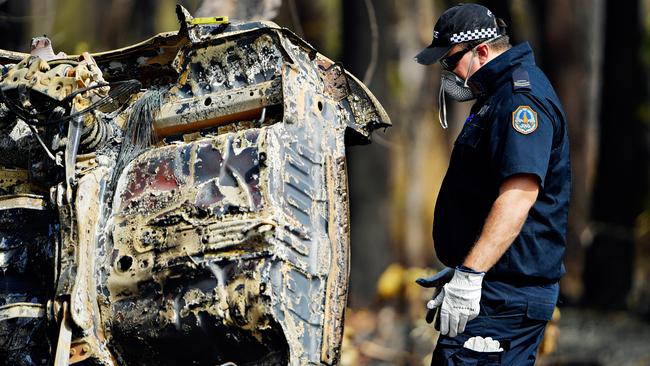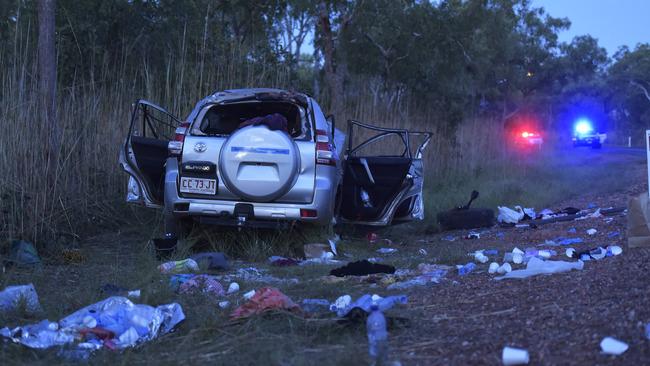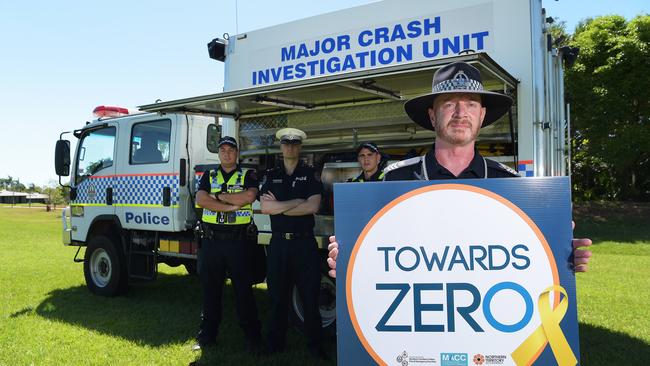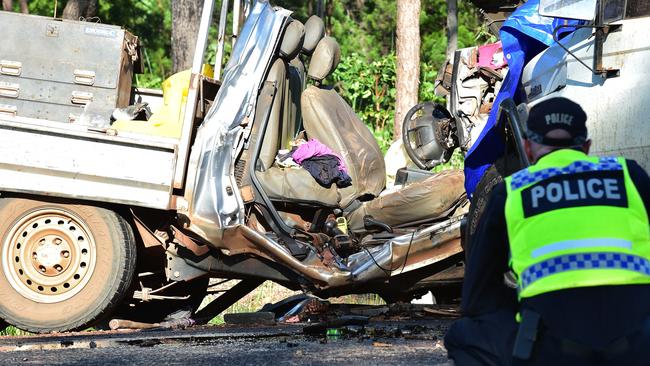IN LESS than four months, 18 people have died on Territory roads. Now first responders are pleading with motorists to take more care. JUDITH AISTHORPE reports
The smells, the sounds of a crash will never leave.
The struggled last breaths of the trapped, who he’s trying to cut out of a wrecked car.
A man pleading to God for his life as he bled out.
The silent cries calling from the victims eyes, begging for it all to be different.
For Mr Bell it’s the eyes that hit the hardest. They ask for things he sometimes cannot give.
The toll road crashes and fatalities have on first responders often takes a back seat when people think about the damage it causes.
The broken bodies, the funerals, the shattered families, the months of rehab are what people remember.
The first responders who frequently deal with the crashes are often forgotten.
NT Fire and Rescue Watch Commander Nick Bell is one of a dozen or so first responders you’ll find at the scene of a major crash.
The Territory has the highest rates of road deaths per capita in the country, and it’s highly likely that those first on the scene will have a connection to a victim.
It’s that connection that Mr Bell finds hard to process after a job.
“The event itself is working hard to disturb your thinking processes in your brain so this is a really difficult thing and very hard to do,” he said.
Learning to live with the trauma he’s seen has been something that Mr Bell has worked on over the course of his career.
Now he sees it as a privilege to help someone in need.
At first, it’s difficult to understand his positive mindset and outlook with the horrific side of his job.
But without it, it’d be hard to stick around in a job as challenging as those on the frontline.
“The shock and the trauma is confronting and that is a difficult thing because we’re used to seeing cars in a normal shape and used to seeing people in good condition and then when you go to a critical incident the bodies are torn and broken and there’s a sight there that’s deeply confronting and deeply concerning,” he says.
The last breath of a person trapped is an extremely intimate and emotionally charged event, he said.
“In among the damage, the bodies and the broken glass and the yelling and the screaming and the other things that go on during critical incidents, there’s also a sense of peace and also a sense of great fulfilment of being able to be with people in their last moments,” he said.
“That’s a privileged time and also I wanted to look at critical incidents and take something away from it that was more than just what I was seeing in front of me and that’s been a thought that has really helped me personally.”
He said seeing the scene not as a place of carnage but as an opportunity to make things better had helped him deal with the confronting scenes.
An old colleague gave Mr Bell advice which has stuck with him throughout his career.
“What ever’s happened is as bad as it can get so what we do is we go there and make it better, whatever we do is making it better,” he said.
He said a strong family network also helped him to cope with the trauma.

The calls from families are the hardest part of dealing with a fatality for NT Police detective Sergeant Michael Ordelman.
In his 24 year career he has learned to adapt to working methodically and without emotion at the scene of a fatal car crash.
He can flip a switch and just get on with the job — despite having to often work with dead bodies in mangled cars.
In the face of those searing images, the emotional phone calls searching for answers he doesn’t have are what hit the hardest.
It can often take months or even years before a fatal crash case is wrapped up.
“I think to a certain extent the trepidation everyone has and especially myself, are the months and possibly years of dealing with the family after that one crash and for the person involved in it, it’s about 30 seconds of their life that they can recall but the effects last for years,” he said.
But before any proper investigation can begin, first responders are called to the scene.
Due to the remoteness of the Territory, they may have to drive for hours, frequently relying on volunteers to help in those first moments.
But often, by the time they arrive, the person inside has passed away.
For the Major Crash Unit, the site then turns into a crime scene, where photos, evidence and the body are collected.
“There’s a twofold approach because there’s a coronial aspect where we prepare a file for the coroner and often times a prosecution file in respect of anybody we have identified who has committed criminal offences, once that is done we place a body in a body bag or quite frankly what’s left of the body,” Sgt Ordelman said.
“In a recent case, we recovered everything but spent three hours looking for the brain at the scene and finally found it in bushland 150m away from the body.
“Myself and talking to a lot of guys to a certain extent we switch off and turn our mind to collecting evidence. You notice oddities about the body where the major impacts have been, what’s been severed.”

When people talk about the hidden road toll, they’re normally discussing the injuries of people who didn’t die in horrific crashes.
But there’s another toll that few think about: the toll on the first responders who are forced to deal with traumatic incidents all too often.
Acting Superintendent Road Policing Drew Slape said there were a number of processes in place to support police members, including peer support officers and psychologists.
For those in the Major Crash Investigation Unit there are mandatory six monthly mental health and welfare check-ups.
“Everybody deals with it differently, I’ve always found that on a personal basis I like to debrief with other police officers who have attended the incident because we need to support each other,” he said.
But for many, dealing with a grieving family is the most difficult part of the job.
“A lot of people think that attending scenes where there’s a deceased person is confronting and it certainly can be we see some fairly horrific incidents, but probably one of the more confronting things that I’ve found as a police officer is seeing the grief of others who have watched a loved one die,” he said.
“Sometimes those ones are more confronting and have a lasting impact or resonate with you more than just seeing someone who’s been killed.”
For St John’s Ambulance station officer Justin Blomeley, a certain resilience can be built but it can just as easily be shattered by one moment, like when an innocent person is killed by a drunk.
“It can ebb and flow of which ones affect you and which ones don’t affect you and it might be something that you don’t think has affected you but 12 months or two years later you see something and you’re reminded of that job that you thought you had processed and need to think about more,” he said.
“Each incident is different as well, there can be similarities but if you’re seeing fatalities and stuff it’s pretty horrific.”

Police have run out of ideas as how to stop road deaths.
They know that if people simply heeded advice — if they didn’t drink and drive, if they drove to the conditions, if they wore seatbelts, if they didn’t speed — there would be far fewer horrific road deaths and injuries.
Accidents would still happen but they would spend far less time searching for body parts on the side of a road.
But they can’t figure out how to get through to people.
Nothing they do makes a difference — since the Towards Zero campaign began, eight people have died on Territory roads.
So now they’re begging.
Drive safely.


Add your comment to this story
To join the conversation, please log in. Don't have an account? Register
Join the conversation, you are commenting as Logout
‘It’s a coup’: ‘Terminated’ Alice Springs principal’s explosive allegations
The former principal of troubled Alice Springs school is alleging he was sacked after standing his ground over a proposal which is going to be ‘a sh-t show’.
Gaps in Darwin maternity services highlighted through stories of loss
Darwin families are making plans to leave the NT as shocking testimonies reveal gaps in maternity care, with some mothers seeking help four times before tragedy struck.